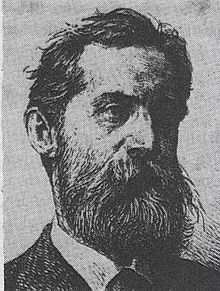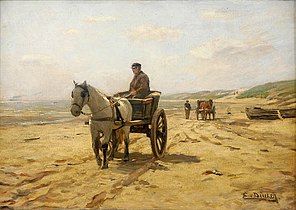Eugen Dücker
You can help expand this article with text translated from the corresponding article in German. (October 2019) Click [show] for important translation instructions.
|
Eugen Dücker | |
|---|---|
 Eugen Dücker (1900) | |
| Born | Eugen Gustav Dücker 10 February [O.S. 29 January] 1841 |
| Died | 6 December 1916 |
| Nationality | Baltic German |
| Education | Member Academy of Arts (1868) Professor by rank (1873) |
| Alma mater | Imperial Academy of Arts (1862) |
| Known for | painting |
| Awards | |
Eugen Gustav Dücker (also Eugène Gustav Dücker; 10 February [O.S. 29 January] 1841 Arensburg (now Kuressaare, Estonia) – 6 December 1916 Düsseldorf, Germany) was a romanticist Baltic German painter.
Biography
He lived and developed almost all his career in Düsseldorf. He is associated with the Düsseldorf school of painting. A notable student of his was the Norwegian landscape painter Adelsteen Normann who studied with Dücker from 1869 to 1872.[1] Other pupils included Heinrich Hermanns, Franz Korwan, Georg Macco, Otto Modersohn, Fritz Overbeck, Edgar Meyer, Heinrich Petersen-Angeln, Oskar Hoffmann and Carl Wuttke. Despite his career's roots in Germany, he spent much of his time in Estonia, where he painted idyllic landscapes of the sea and the countryside.
Perhaps his best known painting is Coastal landscape (Fishermen going home).
Gallery
-
Seashore at Tiskre (1866)
-
Rügen landscape (1869)
-
Self-portrait, by the Baltic Sea
(ca. 1900) -
Crab Fisher on the Ostseestrand
See also
References
- ^ Adlsteen Normann Archived 17 September 2016 at the Wayback Machine, Burlington.co.uk, accessed April 2010
- Members of the Imperial Academy of Arts
- Academic staff of the Imperial Academy of Arts
- Imperial Academy of Arts alumni
- Awarded with a large gold medal of the Academy of Arts
- 1841 births
- 1916 deaths
- People from Kuressaare
- People from the Governorate of Livonia
- Baltic-German people
- Estonian painters
- 19th-century German painters
- German male painters
- 20th-century German painters
- Düsseldorf school of painting
- German painter stubs




